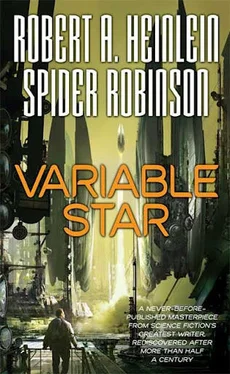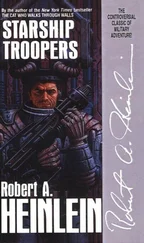It came back. “I know that word. I’ve seen it written, anyway, I just had no idea it was pronounced like that. It means… well, sort of…”
“The best I’ve heard it rendered into Basic so far,” Matty said, “is ‘the presence of absence.’”
“The thing you know because it isn’t there.”
He nodded. “Which, when you think about it, is a pretty fair description of what powers this ship.”
“Do you understand the relativistic engine, Matt?”
He smiled. “You flatter me. That’s my point: there is some reason to believe there’s literally nothing there.”
I shrugged. “Big deal. Is nothing sacred?”
He winced politely. “I asked George R once, what do you guys actually do down there in the Hole? He looked around, leaned close, lowered his voice, and told me the secret. They strap toast onto a cat’s back and toss it in the air.”
And he waited. I knew there had to be a gag, and if I didn’t guess what it was, he would win the exchange I had begun by essaying a pun. Well, it served me right. “But how do dat make de ship go, Mr. Interlocutor,” I asked ritually, conceding defeat.
“They butter the toast, you see.”
Light belatedly dawned. “Ah. Of course. The toast must fall butter side down—”
“—but the cat must land on its feet.” He spread his hands: QED. “Hence the array spins forever, generating power.”
It was a good gag; I grinned in surrender. “It’s so simple once someone explains it.”
He accepted my sword by saying, “To answer your question seriously, I confess the word that best describes my understanding of relativism is probably saudade.”
“The mystery of the ages,” I said, thinking to agree.
“No,” he said with a sudden seriousness that took me by surprise. “ That it is not. Not even the mystery of this age.”
“Uh… I’ll bite. What is the mystery of the ages, this one included?” I said, trying for lightness.
He kept frowning, and had stopped meeting my eyes. “Fermi’s Paradox.”
It took a second. “Oh. ‘Where is everybody?’ you mean.”
He made a single nod. “Nobody even talks about it anymore. We know that life can come to exist in the universe, because it did, once that we know of. We know life can evolve sufficient intelligence to leave its star, because we’ve done it. It is, granted, conceivable that this might occur only once every twelve billion years or more.” He made a face as if he’d bitten into a lemon. “But as for me, I find the creation myth in Genesis considerably more plausible.”
“Didn’t someone settle this back before the Dark Age?” I asked. “Webb? Wrote a book listing forty-nine possible solutions to Fermi’s Paradox—and demolished them one by one, leaving only the fiftieth solution, namely: we’re alone?”
He looked as if he’d chased his lemon with milk. “Webb was an idiot. His analysis presumed that if other life did exist, it could not be more intelligent than him. It was the characteristic flaw of the entire PreCollapse millennium: the assumption of vastly more knowledge than they actually possessed.” He closed his eyes and rubbed them. “Over and over like a recurring flu they developed the imbecile idea that they understood nearly everything, in all but the finest details. They had no slightest idea what lightning was, how it worked. They had absolutely no clue how moisture got farther than about ten meters up a tree—the highest that capillary action can push it. Fifty years after the splitting of the atom, they accidentally noticed for the first time that hurricanes emit gamma rays. There were quite a few large, significant phenomena they could ‘explain,’ often elegantly… over and over again… and had to, because the explanations kept falling apart at the first hard-data-push. Things like the Tunguska Event, gamma ray bursts, why an airplane wing generated lift, what ninety percent of our DNA was doing there… yet they were solemnly convinced they basically understood the universe, except for some details out in the tenth decimal place.
“They somehow managed to persuade themselves that computer models constitute data . That very complicated guesses become facts. They made themselves believe they had the power to accurately model, not merely something as inconceivably complex as, say, a single zygote… but a national economy, a weather system, a planetary ecosphere, a multiplanet society—even a universe. They made solemn pronouncements about conditions a trillionth of a second after the Big Bang, on the basis of computer models, which they had produced with computers not even bright enough to talk, let alone understand speech. They were unlike all the generations before theirs in several ways, but chiefly in that they had no faintest clue how ignorant they were. Previous ages had usually had a pretty good handle on that.”
“Things got worse in that direction soon.”
“Sure. Scientists were claiming godlike knowledge, and couldn’t deliver. It got to where even the average citizen could sense they were bluffing. They could go on for literally days on what happened in the first five minutes of creation, without ever saying a single thing that meant anything, did anybody any good. They wouldn’t even discuss what happened when you died, let alone how random chance produced life. No wonder the citizens decided to go back to a different kind of omniscience, that came with omnipotence and omnibenevolence thrown in at no extra charge. Twentieth-century science handed the world over to Nehemiah Scudder, on a plate. No wonder some people preferred ‘intelligent design’ to evolution. At least it put intelligence somewhere in the mix. Unfortunately, not much.”
I was getting a little dizzy. “I think I lost you around that last curve, Matty. What’s your answer to the mystery? If intelligent life has arisen more than once, in this corner of the cosmos, where is everybody?”
He drew in a long slow breath, and held it for long enough to make me think of the breathing routine I still used at the start of meditation. I kept on thinking of it as he exhaled, and his frown melted away and his face smoothed over and his body language relaxed. He fiddled with his remote, and said, “Authorities differ, but for my money, probably the closest thing to intelligent life we’ll find on Bravo is the spit-tooth sloth,” and the wall showed what I hoped was an enlarged image of the ugliest creature I had ever seen. “Admittedly it is difficult to assess intelligence based on observations made from orbit. Once a probe is fairly sure a given life-form is not a serious threat to man, it moves on to other things that might be. But the sloth’s competition is not impressive.”
It seemed clear he was changing the subject, and he had been so helpful and generous with his time, that was fine with me; his reasons were none of my business. We moved on to an interesting discussion of exotic fauna like hoop snakes, snippers, blimps, and the truly disgusting rocket slugs, which dodge predators by expelling feces so violently they shoot into the air and glide great distances. A whole pod of such frightened slugs, Matty said, can apparently fill the air with a ghastly green mist….
Later on, though, after I’d read up on spit-tooth sloths, I became less certain he’d been changing the subject. A sloth sits high in one of those preposterously tall trees, waiting with infinite patience until something preyish-looking happens to wander by below. Then she (once the males are done with their fertilizing, their only remaining function is as hibernation food) spits out a poison tooth, with high velocity and great accuracy. It drops the prey for so long she has time to slowly descend, retrieve it, and bring it back up the tree to consume at her leisure.
Читать дальше










